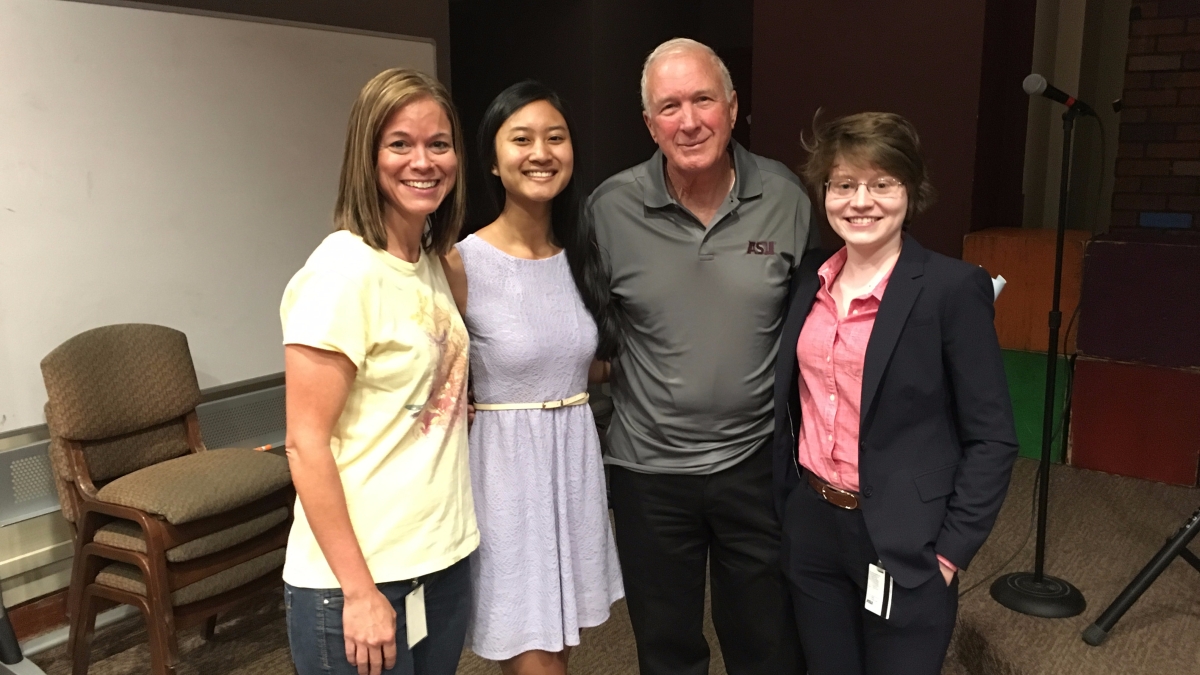ASU alumnus helps students achieve success

ASU alumnus Paul Crecelius meets his two microbiology scholarship recipients Michelle Stephens (right) and Serena Suwarno (second from left), along with Shelley Haydel, associate professor in the School of Life Sciences.
From manufacturing in the aerospace industry to managing environmental services for the Navy, Arizona State University alumnus Paul Crecelius had a range of careers throughout his working life.
“I think a good education is basically the basis of almost any success,” said Crecelius.
Crecelius graduated from ASU’s College of Liberal Arts and Sciences with a Bachelor of Science in chemistry in 1969. He enjoyed chemistry in high school and followed a similar science path of his father, Harry Gilbert Crecelius, who was the director of the Arizona State Health Department laboratories from 1948 to 1975.
“I just like science,” Crecelius said. “I find it very, very interesting. I think chemistry/science is an excellent background for anyone.”
In addition to his chemistry degree, Crecelius earned his Master of Business Administration. He believes having an understanding of business as well as science creates career flexibility and opportunity for growth in different directions.
Crecelius started his career as a manufacturing development engineer in aerospace. Then he transitioned to being an engineer for the manufacture of circuit boards. During the third part of his career, he was the manufacturing manager for a residential and commercial window and door company.
During his time as manufacturing manager, environmental laws and regulations were implemented. He gained a hands-on understanding of what was needed to adapt the manufacturing operations for compliance and how to implement the changes.
Crecelius followed in his father’s path again, ending his career as the department head of environmental services for Navy Public Works in San Diego.
To honor his parents, Crecelius and his wife, Genevieve, created the Dr. Harry Gilbert and Doris Loraine Crecelius Scholarship for undergraduate students in the School of Life Sciences studying microbiology, his father’s field of study. The scholarship provides support to enable students in the discipline to achieve their dreams.
“I just wanted something to recognize my parents and my father’s contributions to the state,” he said. “And I thought microbiology was certainly an important field, so that’s why we picked it.”
After 47 years since graduating from the university, Crecelius came back to meet this year’s scholarship recipients, Michelle Stephens and Serena Suwarno, at the School of Life Sciences undergraduate scholarship and awards event.
Stephens, a National Merit scholar, has been studying mechanisms by which bacteria cause disease. Suwarno, a TGen Helios Scholar alumna, has been conducting research on possible virulence factors of Mycobacterium tuberculosis.
Crecelius and his wife have also created endowed scholarships for undergraduate students studying accounting and chemistry at San Diego State University, her alma mater.
He credited their ability to give back financially to investing wisely and living modestly, while deciding what was truly important in life.
“I think the message would be to use your money wisely, but also, what are you going to do with your money? Where do you want to spend it?” he said. “I’ve been on the Great Wall of China when there was no one else there. … I’ve walked through the Parthenon. These are experiences that I think are extremely valuable.”
Crecelius urges students and future alumni to consider the employment available in their degree and pay attention to how quickly industries can change and advance, especially in areas like technology. He also strongly recommends they get involved with their investing and savings because they will be the ones who benefit from it.
“You need to keep track of what’s going on in the field you’re in and make sure you stay current with what’s going on,” he said. “If you don’t, you’re eventually going to find yourself surprised. And it won’t be a very pleasant surprise.”
As for his own future, Crecelius hasn’t thought too much about a legacy for himself.
“I just feel fortunate that I’ve got a pretty decent life,” he said. “Hopefully, I’ll have a few more years. I’ve got a little more traveling I want to do.”
More Science and technology

Study reveals genetic insight into desert survival
The deserts of the American Southwest are home to the Mojave and Sonoran desert tortoises, two seemingly similar yet genetically…

Study reveals lasting effects of common weed killer on brain health
Environmental exposure to toxins in the air, water or certain chemicals can increase the risk of ill health effects, including to…

ASU grad to use science to get an edge on crime
Editor’s note: This story is part of a series of profiles of notable fall 2024 graduates.As a child growing up in Pinetop,…